|
|
|
Sort Order |
|
|
|
Items / Page
|
|
|
|
|
|
|
| Srl | Item |
| 1 |
ID:
091964
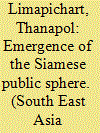

|
|
|
|
|
| Publication |
2009.
|
| Summary/Abstract |
The Siamese public sphere emerged in the second half of the nineteenth century from a series of historical events - the advent of print technology, the signing of new trade treaties and the agreements on extraterritoriality between Siam and several colonial powers, beginning with the British in 1855. This critical development generated a drastic transformation in Siam's mode of textual production, dissemination and consumption. Newspapers, journals and printed books were produced for the first time, and with them came new kinds of knowledge, forms of entertainment and spaces for discursive contestation. These changes inevitably challenged the Siamese ruling elite's ability to control political discourse and literary production, along with their essential cultural authority. Since these new spaces and practices could not be prohibited or closed down by traditional means of law and order such as the exercise of raw power, the Siamese elite responded to the challenges by resorting to various strategies: proclamations, financial subsidies to and buyouts of critical newspapers, the enactment of press laws and participating in the public sphere themselves. Members of the elite thus came to play the role of publishers as well as of political and literary critics. In this respect they became, however influential, only one discursive force among others in the new space.
|
|
|
|
|
|
|
|
|
|
|
|
|
|
|
|
| 2 |
ID:
168438


|
|
|
|
|
| Summary/Abstract |
In 2004, the United Nations Security Council adopted resolution 1540, which acknowledged the non-state acquisition of weapons of mass destruction as a security threat and called on member states to implement “appropriate effective” domestic trade controls. The United States, however, has both promoted the multilateral implementation of strategic trade controls but has also increasingly resorted to extraterritorial enforcement of its counterproliferation rules. How can a multilateral, norms-based international regime like 1540 contend with extraterritorial enforcement based on national interests? We argue that increased U.S. extraterritorial counterproliferation policies are a consequence of the inconsistent implementation of resolution 1540, adaptive and resilient proliferation networks, and a history of expanding legal interpretations of jurisdiction. We find that while U.S. extraterritorial enforcement can effectively disrupt networks hiding in overseas jurisdictions, doing so creates disincentives for states to implement 1540 obligations and undermines broader nonproliferation objectives.
|
|
|
|
|
|
|
|
|
|
|
|
|
|
|
|
| 3 |
ID:
163879
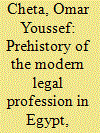

|
|
|
|
|
| Summary/Abstract |
This article examines the emergence of a new corps of legal practitioners in Egypt during the 1860s and early 1870s. The proceedings of hundreds of merchant court cases in mid-19th-century Cairo are replete with references to deputies and agents (wukalā; sing. wakīl) who represented merchant-litigants in a wide range of commercial disputes. Examining how these historical actors understood Egyptian, Ottoman, and French laws, and how they strategically deployed their knowledge in the merchant courts, this article revises the commonly accepted historical account of the founding of the legal profession in Egypt. Specifically, it argues that norms of legal practice hitherto linked to the establishment of the Mixed Courts in 1876 were already being formed and refined within the realm of commercial law as part of a more comprehensive program of legal reforms underway during the middle decades of the 19th century. In uncovering this genealogy of practice, the article reevaluates the extent to which the khedival state shared a legal culture with the Ottoman center, and, simultaneously, created the space for a new form of legal representation that became ubiquitous under British, and, subsequently, postcolonial rule.
|
|
|
|
|
|
|
|
|
|
|
|
|
|
|
|
| 4 |
ID:
172451


|
|
|
|
|
| Summary/Abstract |
The 1917 promulgation of a new Ottoman family law is recognized as a landmark moment in the history of Islamic law by scholars of women and gender in the Middle East. Yet the significance of the 1917 law in the struggle over religious jurisdiction, political power, and Ottoman sovereignty has been overlooked in the scholarship on both Ottoman legal reform and World War 1. Drawing on Ottoman Turkish, German, French, and English sources linking internal interpretations of the law and external reactions to its passage, we reinterpret adoption of the family law as a key moment in the geopolitics of World War 1. We demonstrate that passage of the law was a critical turning point in the wartime process of abrogating the capitulations and eliminating the last vestiges of legal extraterritoriality in the Ottoman Empire. The law is situated in its wartime political context and the geopolitical milieu of larger Europe to demonstrate that, although short-lived, the 1917 family law was a centerpiece of the wartime struggle to define extraterritorial rights of the Ottoman Empire, the Great Powers, and their protégés within the empire.
|
|
|
|
|
|
|
|
|
|
|
|
|
|
|
|
| 5 |
ID:
147887
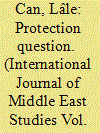

|
|
|
|
|
| Summary/Abstract |
This article examines the impact of the Ottoman Empire's battle against legal imperialism on the status of Central Asians in its domains, specifically after the promulgation of a nationality law in 1869 that classified them as foreigners. It traces how the threat of Muslim colonial subjects attaining European consular protections led to the emergence of a “Central Asian protection question”: whether Afghans, Bukharans, and Chinese Muslims had legitimate claims to European legal nationality and, by extension, capitulatory privileges. Through a number of case studies, the article shows how the Ottoman Foreign Ministry fused international legal norms and pan-Islamic claims to arrive at the position that Central Asians from informally colonized lands were not “real” subjects of European empires, and that they were under the exclusive protection of the caliphate. This strategy, I argue, undermined the creation of an Ottoman citizenship boundary and opened up a complex field of inter- and intraimperial contestation about who was a foreigner. In contrast to positive associations with legal pluralism in this period, Central Asian migrants and pilgrims who were protected by the caliph but not recognized as Ottomans or European subjects found that they could not benefit from practices such as forum shopping and affiliation switching. And while the notion of foreignness remained subject to multiple and conflicting interpretations across the empire, I argue that nationality as a legal category was incontrovertibly becoming a defining feature of these foreign Muslims' rights and status in the sultan's domains.
|
|
|
|
|
|
|
|
|
|
|
|
|
|
|
|
| 6 |
ID:
161191
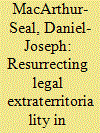

|
|
|
|
|
| Summary/Abstract |
The short-lived Allied occupation of Istanbul produced a distinctive blend of legal innovation and revival, creating new mixed courts, reanimating the contested capitulations, and pressuring the Ottoman government to abandon wartime legislation in favour of new laws conducive to European interests. Such measures were intended to serve a military regime notable as much for its disregard for legal procedure when it suited the interests of the occupying Allies as its insistence on protecting the legal privileges of its own subjects. The article shows how the resulting tensions between Britain and the Istanbul and Ankara governments over law and its enforcement furthered the rift between Britain and Turkey until the eventual abandonment of extraterritoriality during the Lausanne conference in 1923.
|
|
|
|
|
|
|
|
|
|
|
|
|
|
|
|
| 7 |
ID:
161192
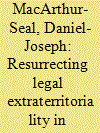

|
|
|
|
|
| Summary/Abstract |
The short-lived Allied occupation of Istanbul produced a distinctive blend of legal innovation and revival, creating new mixed courts, reanimating the contested capitulations, and pressuring the Ottoman government to abandon wartime legislation in favour of new laws conducive to European interests. Such measures were intended to serve a military regime notable as much for its disregard for legal procedure when it suited the interests of the occupying Allies as its insistence on protecting the legal privileges of its own subjects. The article shows how the resulting tensions between Britain and the Istanbul and Ankara governments over law and its enforcement furthered the rift between Britain and Turkey until the eventual abandonment of extraterritoriality during the Lausanne conference in 1923.
|
|
|
|
|
|
|
|
|
|
|
|
|
|
|
|
|
|
|
|
|